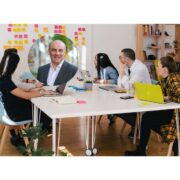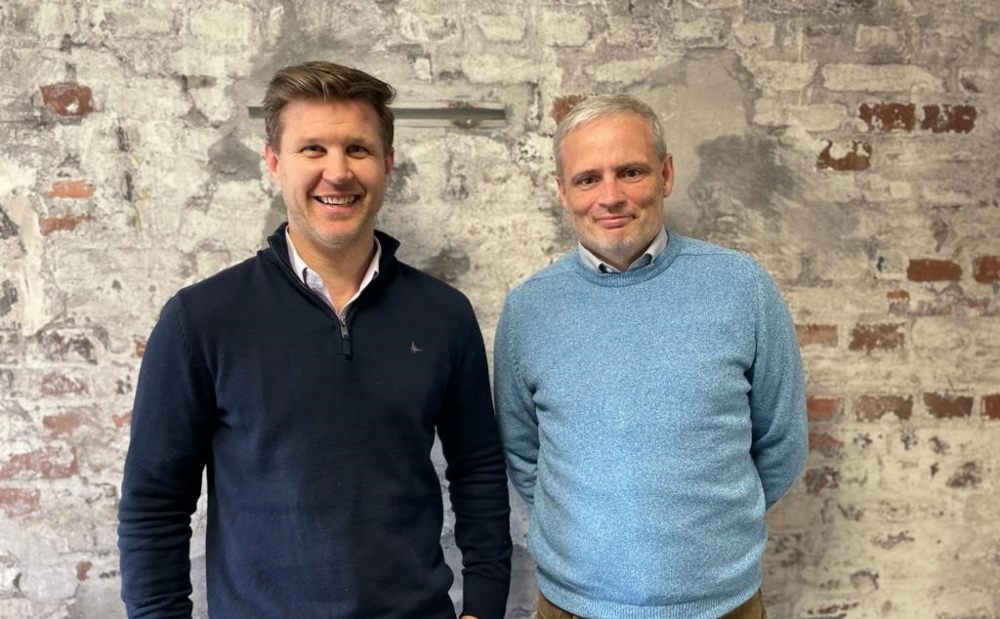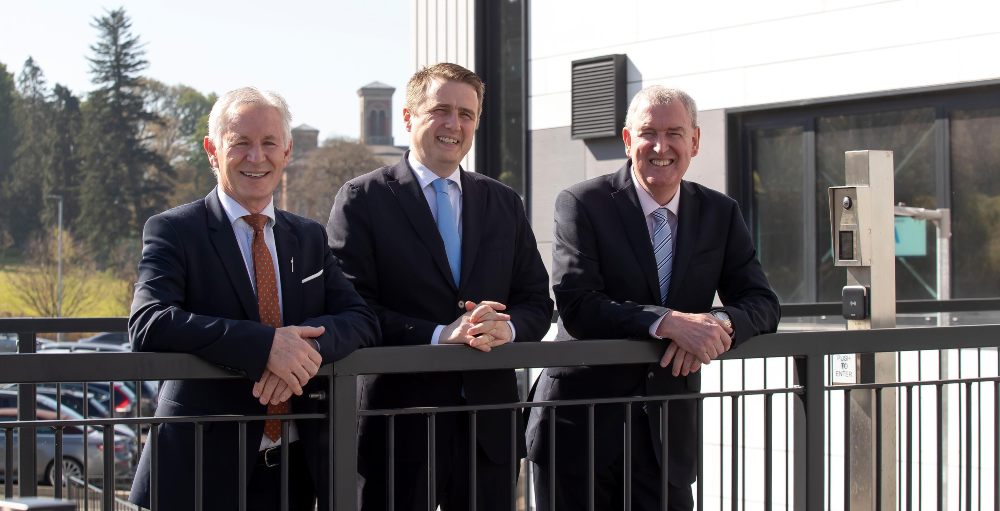Ray Naughton, founder and managing director of NEG8 Carbon, shares his life and business lessons.
NEG8 Carbon is an Irish company founded in 2014 by visionary leaders managing director Ray Naughton and technology director Professor Don MacElroy. In 2021, they were joined by chief technology officer Dr John Breen and a growing technical team.
Their mission is to reverse the devastating effects of climate change by removing carbon dioxide from the atmosphere.
“Our unique strength lies in our efficient method of capturing CO₂ directly from the atmosphere”
By 2040, NEG8 Carbon aims to deploy tens of thousands of DAC adsorber systems with the goal of mitigating 100 million tonnes of CO2 every year by 2050.
Ray Naughton is an experienced businessman, with a background in international business, having led Siemens Nixdorf in Ireland over a period of 11 years. He is also co-founder of a university seed fund where he invested in and helped develop many IP-based high-technology businesses.
Ray continues this work as a private investor and advisor to a number of early-stage Irish technology companies.
Tell us about your background, what journey did you take to arrive at where you are?
I have a background in managing technology businesses. I came from the IT industry into the venture capital industry and started a university seed fund which commercialised IP coming out of the Irish universities. From there, I became interested in commercialising a piece of IP related to climate change. And so was born NEG8 Carbon back in 2014. In 2021, we stepped out of the university into Waterford to commercialise our research in Direct Air Capture (DAC) and how to counteract climate change using this technology.
“Our aim is to capture 100 million tonnes of CO₂ per annum by 2050. And we believe that direct air capture can also play a role in helping Ireland meet its CO₂ emissions reduction targets”
Why are you doing what you are doing? What need are you meeting? What’s your USP?
Our unique strength lies in our efficient method of capturing CO₂ directly from the atmosphere. Our aim is to be the lowest-cost company in the Direct Air Capture field, and our focus is clear: to remove atmospheric CO₂ affordably in order to make it scalable for the mass deployment needed for DAC to make a difference to the climate.
This goal defines our purpose. We are doing this in response to the urgent issue of global warming which is causing climate change. Already we are seeing the devastating effects of global warming, e.g. the huge wildfires, floods and droughts around the world.
The current concentration of CO₂ in the atmosphere stands at around 430 parts per million and is increasing by roughly 3 to 4 ppm each year. If this trend continues, the next 30 years could bring an additional 1°C rise in global temperature since industrialisation on top of the 1.5°C already observed. This is a serious issue for humanity, and our work is a direct response to that challenge.
How did you fund and start the business and what are your growth plans?
I had an opportunity to get involved in commercialising a piece of intellectual property in an Irish university (Trinity College Dublin and then UCD) which addressed the issue of efficient carbon capture. And it was the idea that we could use technology to impact climate change that fired up my enthusiasm to start a business to deal with this issue.
Our aim is to capture 100 million tonnes of CO₂ per annum by 2050. And we believe that DAC can also play a role in helping Ireland meet its CO₂ emissions reduction targets.
“Commitment only comes when people feel part of the process. That’s your role as a leader: to create an environment where people can get involved, feel valued, and contribute”
What are your key skills and qualities that set you apart?
The most important things in a science-based business like ours is the people who work for the business. We have some of the finest minds in the carbon capture industry working for us in Waterford. We have on board Professor Don MacElroy, Emeritus Professor of Chemical Engineering at UCD. As CTO, we have Dr John Breen, a specialist and leader in material science. And then a whole team of PhD level engineers and scientists whom we’ve recruited from all over the world to come to work together in Waterford to develop Direct Air Capture to tackle climate change.
What (or whom) has helped you most along the way? Who was your greatest mentor/inspiration?
My greatest inspiration was a man called Heinz Nixdorf. Heinz was a German entrepreneur whom I worked with for many years and he ran a company called Nixdorf Computer. One day, he met me over a coffee, and rather than talking about business, he just asked me, “Herr Naughton, what are you doing for the kinder?”. At the time, I was doing nothing for the kinder (children), but he challenged me to look outside of business and to think about putting an objective aside for the rest of my life to do something for the next generation. And that was an inspiring moment and is perhaps the big driver for me behind this project.
What was the greatest piece of business advice you ever received?
There’s no shortage of business advice out there, but a few lessons stand out. One of the most important for me is understanding the difference between leadership and management. In a leadership role, your job isn’t to do everything yourself but it’s to bring people with you. That means sharing ideas, socialising them, and creating a sense of shared purpose. It’s far more valuable than trying to carry the load alone. Part of that is recognising the importance of involvement.
You can communicate endlessly, but if people aren’t truly engaged, they won’t listen, and they certainly won’t commit. Commitment only comes when people feel part of the process. That’s your role as a leader: to create an environment where people can get involved, feel valued, and contribute. When you do that well, you don’t just build a strong business, you build a place where people enjoy themselves and make money. And that’s a good outcome for everyone.
What circumstances/qualities/events can mark the difference between success or failure in life or business?
I think the most stand-out factors are determination and consistency. Being consistent both within your business and in your external messaging is important. And another aspect that matters is clarity. You need to be clear about what you’re trying to achieve and how you plan to go about it. That kind of consistency builds trust, strengthens your direction, and is a key factor in long-term success.
At NEG8 Carbon we also place a strong emphasis on respect and it’s a core part of how we operate. You need to respect your colleagues, their ideas, and their contributions. Respect is a huge factor in organisational performance and happiness. That’s the kind of environment we’re building.
“I have come to recognise that life is really one long process of iteration of learning and applying what you’ve learned. It’s a cycle of constantly adjusting your direction based on new information and experiences”
What was the most challenging aspect of either starting or growing the business?
Finding the right people is a challenge but extremely rewarding when you get it right.
How did you navigate your business through the pandemic and what lessons did you learn?
As a research and development-based business, the pandemic didn’t present major difficulties for us. Much of our work is intellectual and knowledge-driven, which meant we could continue operating without significant disruption.
How has digital transformation been a factor in your scaling journey and do you believe Irish firms are utilising digital technologies sufficiently?
Digital technologies play an important role in our business in supporting our AI control systems. But just as importantly, they help us share our message more widely through social media and other communication channels to reach a broader audience and explain what we’re doing. So digital tools are central not only to our internal systems but also to how we connect with the wider public.
If you were to do it all over again, what would you do differently?
I have come to recognise that life is really one long process of iteration of learning and applying what you’ve learned. It’s a cycle of constantly adjusting your direction based on new information and experiences. Whether in business or in your personal life, you’re always learning. That’s the core of it. When the learning stops, that’s when problems tend to arise. So, the key is to keep learning every day and to apply that learning as you go. It’s an ongoing loop: learn, apply, adapt—over and over again.
“Before I hire anyone, I always say the same thing: don’t join us unless you’re ready to learn every day, be challenged in your work, and take the lead in what you do”
Who inspires you in business today?
I have great respect for all the leaders of science-based technology companies in Ireland who have taken the bold step to commercialise scientific and engineering innovations. It’s a tough path, especially in Ireland, where the focus tends to be on pharma and medical devices, the more established sectors here. Ours is a much smaller space, with very few start-ups built around strong intellectual property and deeply scientific teams. So, I admire the companies that have already paved the way in this field. They’ve taken on a real challenge and shown what’s possible.
What advice/guidance do you give new hires and how do you nurture talent in your organisation?
Before I hire anyone, I always say the same thing: don’t join us unless you’re ready to learn every day, be challenged in your work, and take the lead in what you do. That’s what we need from everyone in the company. We rely on people who can think for themselves, contribute meaningfully, and work collaboratively with respect towards their colleagues. Everybody in a healthy organisation should have the power to make decisions in their own areas of responsibility.
What business books do you read or would recommend?
I read a variety of book genres and learn about life and life lessons from history and literature.
“I believe AI will have a major impact, not just on how people work, but also on the overall efficiency of businesses”
What technologies/tools do you use personally to keep you on track and what social media platforms do you prefer and why?
I find LinkedIn works well to connect with people, engage in topical discussions, and to learn about what’s happening in our industry. I use WhatsApp and Zoom to communicate.
What are your thoughts on where technology overall is heading and how it will apply to business generally and your business particularly?
AI is the big topic at the moment, and we’re using it in our control systems to improve the efficiency of our technology. It allows us to adapt in real time to factors like ambient conditions, weather, and the specific characteristics of each deployment site. This kind of adaptability makes a real difference. I believe AI will have a major impact, not just on how people work, but also on the overall efficiency of businesses.
Finally, if you had advice for your 21-year-old self – knowing what you know now – what would it be?
One of the things I’ve come to realise in business is that you end up using everything you’ve ever learned. No knowledge should be wasted, and the learning never really stops. So, if I were to give advice to my 21-year-old self, it would be this: study more.
-
Bank of Ireland is welcoming new customers every day – funding investments, working capital and expansions across multiple sectors. To learn more, click here
-
For support in challenging times, click here
-
Listen to the ThinkBusiness Podcast for business insights and inspiration. All episodes are here. You can also listen to the Podcast on:
-
Spotify
-
SoundCloud
-
Apple





